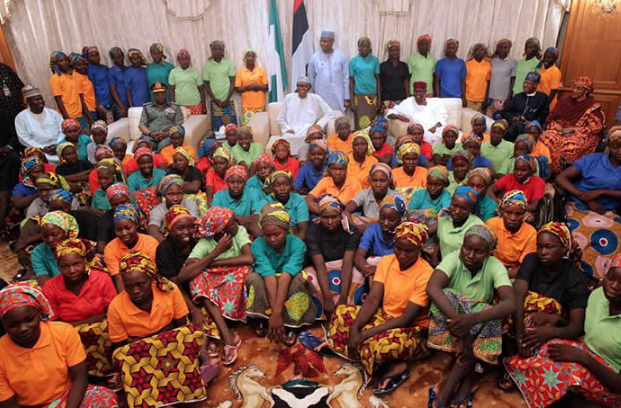EXCITING NEWS: TNG WhatsApp Channel is LIVE…
Subscribe for FREE to get LIVE NEWS UPDATE. Click here to subscribe!
Military pressure, in-fighting within Boko Haram and Nigerian Muhammadu Buhari’s health combined to secure the release of 82 kidnapped Chibok schoolgirls, sources said Monday.
The latest batch of the more than 200 schoolgirls abducted in April 2014 were freed Saturday in a prisoner swap for three senior jihadist commanders, all of them Chadian nationals.
A source with contacts among the Islamist militants under leader Abubakar Shekau said the students were handed over in a forest to the northeast of the town of Banki, on the border with Cameroon, after months of talks.
“Shekau kept unnecessarily dragging the negotiations to gain more leverage,” the source, who has previously provided regular, reliable information on the jihadists, told AFP.
But he was forced to accept terms after air strikes on his men in Balla village, on the edge of Sambisa Forest in Borno state, last month.
Several of his senior commanders were killed in the April 28 attack and Shekau himself was said to have been injured, although he later denied it.
“The reason why the aerial bombing in Balla forced him to seal the deal was he had lost many commanders and badly needed replacements,” the source said.
Shekau then gave the green light to his negotiator, a Cameroon national stationed in a village on the other side of the border, to agree to the girls’ release, he added.
– Health concerns –
Nigeria’s government has refused to comment publicly on the prisoner swap deal and it is not clear whether any ransom was paid, making it difficult to assess how Shekau will benefit.
Talks are already said to have started for the release of some or all of the 113 girls still being held in what would be a boost for Buhari and his government if successful.
A security source involved in the negotiations said the talks took place over six weeks and involved an almost daily “back and forth” between the two sides.
“Boko Haram wanted money not the release of prisoners. For me, the release (of the girls) was more to do with the state of Buhari’s health than Boko Haram pressure,” he added.
Buhari, a former military ruler, was elected on a promise to defeat Boko Haram and has been seen as giving impetus to the counter-insurgency. But there has been mounting concern about the 74-year-old’s health after he spent nearly two months undergoing treatment in London and made few public appearances since March.
On Sunday evening, he looked painfully thin when he met the 82 girls in Abuja then immediately flew to the British capital for another round of treatment for an undisclosed illness.
AFP





